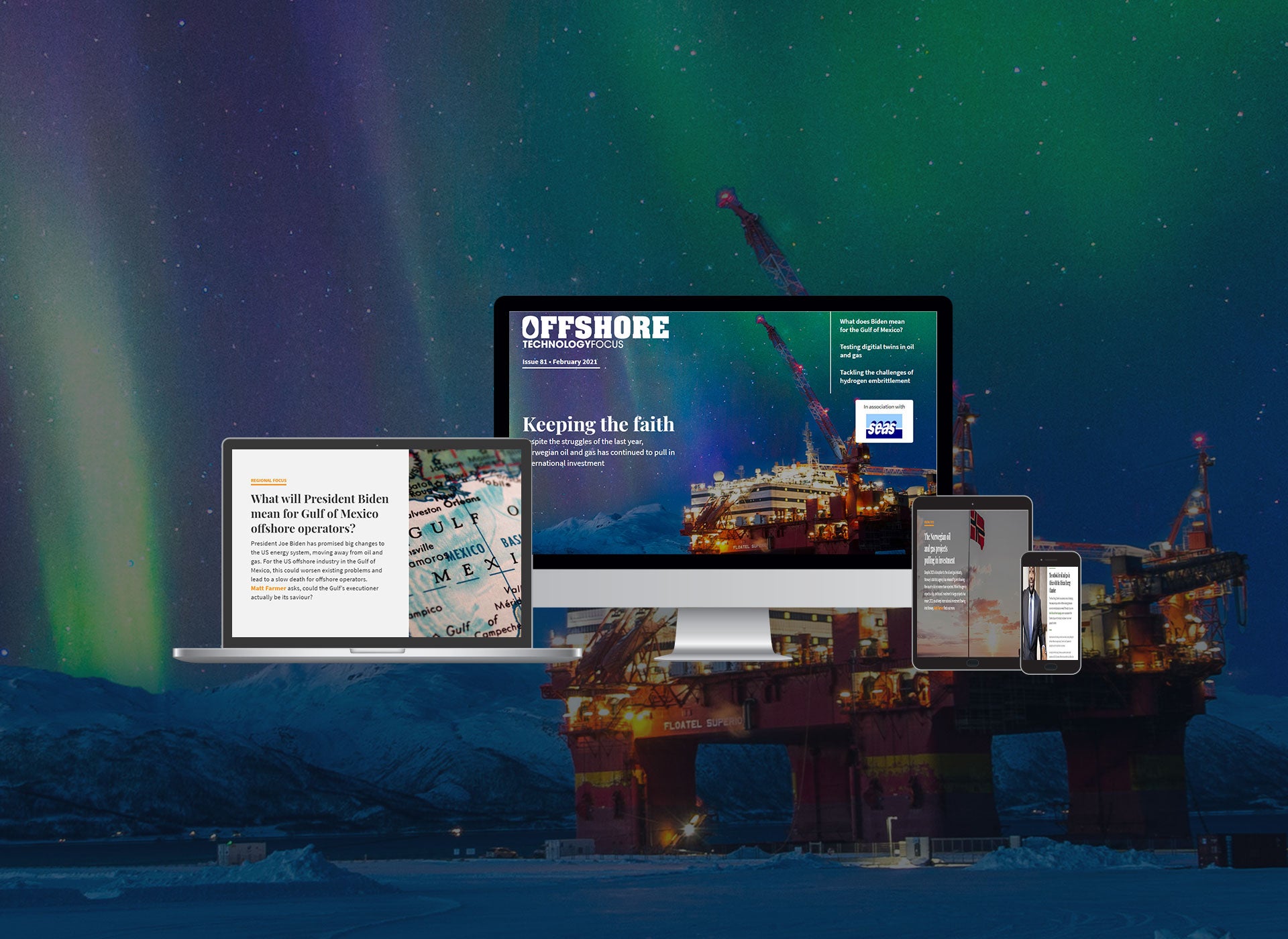
Despite 2020’s disruption to the oil and gas industry, Norway’s statistics agency has released figures showing the country did no worse than expected. While a dip is expected in the coming year, large projects are seeing international investment continuing to flow into Norway. So why has the Norwegian offshore sector remained so resilient and what can others learn from it?
Elsewhere, President Biden has promised big changes to the US energy sector, moving away from oil and gas and looking to invest massively in renewables. For the US offshore industry in the Gulf of Mexico, this could worsen existing problems and lead to a slow death for offshore operators. We dive into just what the new president means for the region and whether the offshore industry needs to be worried.

Discover B2B Marketing That Performs
Combine business intelligence and editorial excellence to reach engaged professionals across 36 leading media platforms.
And speaking of threats to the offshore industry, the issue of hydrogen embrittlement is one that has perhaps gone underreported. Offshore operations come with a number of occupational hazards, and while many of these are understood and work is being done to reduce their impact on people and productivity, hydrogen embrittlement remains a relatively unknown phenomenon. William Hackett, a chain product manufacturer, is looking to change this and raise awareness of the risks.
Whether you are on a desktop, tablet or smartphone, you can read the magazine for free online, and join the conversation on Twitter.

In this issue
The outlook for oil and gas in Africa with the African Energy Chamber

US Tariffs are shifting - will you react or anticipate?
Don’t let policy changes catch you off guard. Stay proactive with real-time data and expert analysis.
By GlobalDataThe African Energy Chamber’s annual report warns of challenging times ahead and says a rethink of offshore licensing procedures and environmental standards are needed if the sector is to survive. Heidi Vella and Verner Ayukegba, senior vice president of the Chamber, discuss why the industry must take a ‘now or never’ approach to reform.

What will President Biden mean for Gulf of Mexico offshore operators?
President Joe Biden has promised big changes to the US energy system, moving away from oil and gas. For the US offshore industry in the Gulf of Mexico, this could worsen existing problems and lead to a slow death for offshore operators. Matt Farmer asks, could the Gulf’s executioner actually be its saviour?

The Norwegian oil and gas projects pulling in investment
Despite 2020’s disruption to the oil and gas industry, Norway’s statistics agency has released figures showing the country did no worse than expected. While the agency expects a dip, continued investment in large projects has meant 2021 could keep international investment flowing into Norway. Matt Farmer finds out more.

How innovation is changing the role of the seep hunter
Seep hunting is a costly process that doesn’t guarantee success, so knowing which seeps are most likely to result in a major discovery is key. Andrew Tunnicliffe talks with Ocean Infinity about how new technologies could reduce costs and improve the chances of success.

Testing digital twins: do they work in oil and gas?
Digital twins are a hot topic in a few industries, but what’s the true operational value of creating digital copies of complex infrastructure such as oil and gas platforms? Yoana Cholteeva looks into the challenges in implementing digital twins, and the importance of smart integration to get the most out of this technology throughout an asset’s lifecycle.

Around the world: how has Covid-19 affected offshore exploration?
Oil and gas exploration projects around the world have been highly influenced by the Covid-19 pandemic and its ripple effects. Yoana Cholteeva looks at how major oil producing regions were affected in 2020.

Embattled and embrittled: how the offshore industry is tackling hydrogen embrittlement
Offshore operations come with a number of occupational hazards, and while many of these are understood and work is being done to reduce their impact on people and productivity, hydrogen embrittlement remains a relatively unknown phenomenon. JP Casey speaks to William Hackett, a British chain product manufacturer looking to raise awareness of this unique threat.

Everything you need to know about Romania’s oil and gas industry
Once Europe’s largest oil and gas powerhouse, Romania still holds a proud place among Eastern European nations but in recent years its offshore industry has remained mostly idle. With international investors deterred, the government has promised changes that could see a new start for Romania’s offshore industry. Matt Farmer learns more.

Preview – Offshore Technology Focus April
In light of Brexit, the possibility of a new attempt at Scottish independence is looming large. If it should happen, one of the big questions that will need answering is what happens to North Sea oil? We dive into the geopolitics of the region and ask what the future holds for Scotland’s relationship to the North Sea.
Also in this issue, we find out how Covid-19 has impacted the decommissioning sector, look at the efforts to solve offshore’s methane problem, and learn about the problems of the offshore helicopter industry.
Plus, we delve into the UK’s first postgraduate degree in Energy Transition Systems and Technologies, examine the situation around Total’s $20bn LNG project in Mozambique, investigate BOSS’s autonomous solution for seismic surveys, and ask whether Total’s withdrawal from the American Petroleum Institute will prompt an exodus of majors.





